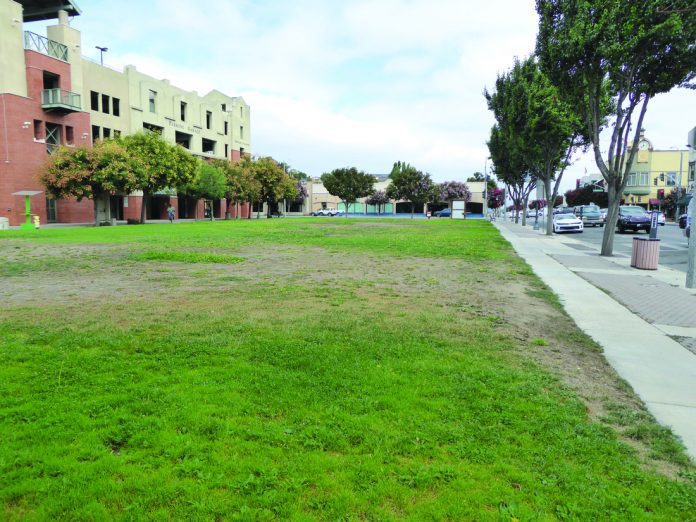California Attorney General Xavier Becerra has spoken. A referendum vote—pushed by Hollister Mayor Ignacio Velazquez—on the sale of a half-acre empty lot at the city’s center would not be legal.
“The City resolution is not subject to referendum,” Becerra concluded in an 11-page opinion released late on a Friday afternoon, April 27.
It took Becerra nine months to release the opinion, which had been sought by Assemblymember Anna Caballero, an opponent of the public vote on the Hollister development.
“I was glad to see that the attorney general took that position.” she said in an interview last week.
In contrast, the mayor said he was “extremely disappointed.” He said he would be consulting with a lawyer, and was not sure what next steps he would take—except that he would be talking about the issue in his reelection campaign in the fall.
The Community Foundation for San Benito County, some local developers and business owners and Caballero had all lined up in opposition to a referendum that would have sought voter approval of the council’s decision last year.
They are hoping that Becerra has the last word—that his long-awaited opinion will end the dispute, and enable the project to begin on a plot of land that has been vacant since buildings destroyed in the 1989 earthquake were cleared.
In July 2017 Velazquez collected 2,465 signatures on a petition for a referendum, which Caballero, at the council’s request, immediately passed on to the attorney general for review.
Becerra’s opinion, while not the same as a court ruling, effectively blocks any public vote on the sale of prime downtown real estate.
The foundation was ecstatic at news of the opinion. In a statement, Gary Byrne, president and CEO of the charitable foundation, said the long-awaited decision allows “development of a state-of-the-art philanthropic center in downtown Hollister focused on our local nonprofits.”
“We would like to thank Attorney General Becerra and his staff for evaluating this initiative,” Byrne said in a statement. “We would also like to thank city council members and staff for staying the course and Assemblymember Anna Caballero for her leadership in carrying this local issue to Sacramento for clarification.”
“We hope that we can now put this issue behind us and focus on the needs of our local nonprofits, and the entire community, who benefit tremendously from this project,” he said.
Byrne revealed in an interview last week that the foundation has secured an additional commitment from Hollister residents Randy and Rebecca Wolf—who committed $900,000 to the creation of a philanthropy center last year—to provide enough funds to build the foundation building next door to Velazquez’ restaurant, The Vault.
“This proposed project will revitalize an underdeveloped downtown,” said Byrne.
“We hope that we can now put this issue behind us and focus on the needs of our local nonprofits, and the entire community, who benefit tremendously from this project.”
“They want a Taj Mahal,” the mayor said of the foundation’s plan. “It’s the biggest scam I’ve seen here in a long,long time.”
“They’re going to take parking from the public, for the developers’ use,” said Velazquez.
The council approved the sale of the parcel last summer to the Community Foundation and the Del Curto Brothers Group, local developers, for $390,000. Documents obtained by the Dispatch last fall showed that an appraisal conducted several months earlier was $300,000 higher, but was never passed on the council by city staff.
Velazquez said the change in the city’s redevelopment plan for the block from a public plaza to a high-density mixed use office-housing-retail project deserves more public debate.
Velazquez has been on the sidelines on the issue because the building and restaurant he owns, The Vault, sit immediately adjecent to the vacant land, and he could stand to gain by decisions made about the fate of that site. He has not participated in the negotations or decisions, to avoid even an appearance of conflict of interest.
He said his opposition to the development plans is ironic, because he contends the value of his property and his business would probably increase if the plans were completed.
The preliminary plan—unanimously approved, with the mayor abstaining, by the City Council, acting as a “successor agency” to its community development agency, in 2016— would construct two projects: a privately funded Philanthropic Center with a small public plaza, and multi-building commercial complex with retail and office on the first floor and residential condos on upper floors.
Despite the delays, Byrne said there is no indication the Del Curto Brothers are changing their minds.
Detailed plans have not been revealed to the city, and will require multiple presentations before the council and the Planning Commission, as would any major commercial project.
Becerra’s opinion agreed with Caballero and city staff, that the decision to sell the property and give exclusive rights to the foundation and the Del Curto Brothers was merely “an administrative” act, fulfilling a redevelopment plan that had already been in place. Strictly administrative actions are not subject to public referenda, he said.
If Becerra had concluded that the council’s action was a “legislative” action, setting policy—which is Velazquez/ contention—then it would be subject to a public referendum. The mayor contends that the development plan approved by the city in 2014 established the site as a public plaza, a community event space.
He said the plan was later revised and proposals were sought that were tailored to the specific plans of the foundation and the local developers, who then were sold the land well below market value.










